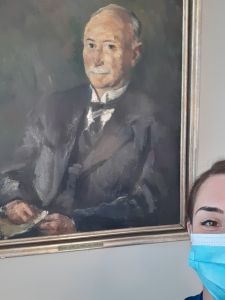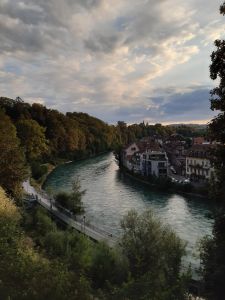EAUN Fellowship Report


Prof. E. Wildbolz, founder of Inselspital’s urology clinic
My name is Eleni Zouzoula and I am a registered nurse from Greece. In 2014 I completed my nursing studies. In 2019 I earned my master degree in Health Science informatics and now I’m studying for my second master degree in Health Services Management. I have been working at the General Hospital of Santorini since 2016, mostly at the emergency department.
Santorini is a small and popular island in the South Aegean of Greece. It is considered to be the lost Atlantis. Santorini is well-known for its beautiful sunset, the volcano and sea view from the caldera, attracting more than 1 million tourists per year, especially during summer.
The General Hospital of Santorini is one of the three general hospitals in Cyclades. It is located in Arterados, a village of Santorini, and is open 24 hours a day. It is equipped with 37 beds and has 54 employees. The health services are divided into two sections, the surgical and the clinical section. The urological cases fall within the surgical field, as there is no autonomous urological department. However, there is a urological office at the outpatient clinic, as well as facilities for urological patients to get examined at the emergency department, operated in the operation theatre and hospitalised at the main clinic. Every year the hospital admits approximately 450 urological patients.
“Enriching learning experience at Berne University Hospital (Inselspital), Switzerland, 6-19 July 2020”
The hospital employs 1 urologist and the main fields of action are: UTI, stone treatment of the urinary tract, urinary retention and neurogenic bladder. Main operations taking place are: TURP and testicular torsion. The nursing team consists of 1 nurse director, 2 head nurses, 17 registered nurses and 8 assistant nurses. Each member of the team is responsible for many care tasks and aims to provide high quality nursing care with respect for the patients’ needs.
Fellowship programme
As a young nurse and restless spirit who supports lifelong learning and education, I didn’t have to think twice when I received the e-mail about the fellowship programme, I just applied! It was a great opportunity to visit a differently organised European hospital for two weeks and to enrich my knowledge of nursing practice. In my home hospital, unfortunately, I have not yet had a chance to see that many urological cases. The reasons that convinced me to apply for Berne University Hospital were the wide range of modules offered, most of them were unknown to me, and the opportunity to observe the clinical processes and approaches. I had the intention to learn as much as possible and apply this to my everyday clinical care practice.
Host Institution
Berne University Hospital, Inselspital, has excellent facilities, is very organised and uses up to date equipment. The medical and nursing staff is well educated and ready to deal with every medical case they have to face. The Swiss healthcare system is regulated by the Swiss Federal Law on Health Insurance and there are no free state-provided health services. Private health insurance is compulsory for everyone residing in Switzerland.
The Department of Urology is located in the Anna Seiler-House of the Inselspital. The clinic was founded in 1941 by Professor Wildbolz and today it consists of 45 beds and is the largest stone- treatment centre in Switzerland. In the outpatient clinic, comprehensive and modern treatment is given to about 10,000 urological patients per year. About 2,000 patients receive inpatient treatment, including the day care clinic, plus 500 day care patients per year. Multiple specialised treatments are offered, such as minimal invasive prostate treatment and extensive reconstructive surgery for all urological disorders.
The programme was as follows:
Tuesday 7 July
• Welcome & introduction to the Department of Urology
Wednesday 8 July
• Visiting the operation theatre: cystectomy and ileal conduit
• Attending the educational meeting
Thursday 9 July
• Accompanying the nurse for patients with neobladder and ileal conduit
• Pelvic floor training
Friday 10 July
• Operation theatre: URS Stone treatment
Monday 13 July
• Urostoma Care
• Palliative Care
Tuesday 14 July
• Operation Theatre: TURP
Wednesday 15 July
• ICU
• Attending the educational meeting
Thursday 16 July
• Bladder dysfunction, intermittent self-catheterisation
Friday 17 July
• Accompanying the nurse at the ward
Operation theatre
The second day of the fellowship programme included a visit to the operation theatre. It was the day that impressed me the most. I had the chance to see a cystectomy and how a stoma with external drainage was being created.
After the operation, Kathi Ochner, an expert urology nurse, explained to me how the patients are trained in order to take care of their stoma and get used to the change in their body image, the advantages and side effects of it and what the patient should take care of in the first three months post-operatively.
The ward
The ward consists of two floors with single, double and triple rooms. The nurses of the ward were friendly and full of smiles. They explained to me what they did and how they organised patient are. They are responsible for three or four patients and they take care of all their individual needs. Patients stay at the hospital alone, so nurses are the persons that take care of patients and patients can rely on them for everything. In Greece is not the same. There is a shortage of nurses in every hospital, which means that they do not have the time to provide all the necessary care. For this reason, the patients’ relatives contribute to their care.
Outpatient clinic
In the outpatient clinic, nurses specialise in various fields. I accompanied Daniela, a nurse specialised in self-catheterisation. That day, she taught a male patient how to self-catheterise. This procedure took 1 hour and a half. They tried it three times with different types of catheters, until the patient felt comfortable trying it at home and figure out which one is easier for him to use. She explained each step of the catheterisation to the patient in detail and also answered his questions and concerns.
Palliative care
At the palliative care centre, I had the pleasure of meeting Mrs. Monica Fliedner, a nurse specialised in palliative care. She showed me around in the centre and in the meantime we had a conversation on what palliative care means and can offer and about the SENS structure for palliative assessment and planning.
Palliative care is more than just painkillers. Monica explained to me that nowadays, with the coronavirus in the foreground, palliative care can play a very important role, and take away some of the workload from other nurses, as palliative care nurses will talk to the patients and their relatives about end-of-life decisions and offer them alternatives.

A beautiful view on the river Aare in Berne, Switzerland
The city
Berne is the capital of Switzerland and the most beautiful city I’ve ever been to so far. Berne is built on the banks of the river Aare and there are water fountains almost everywhere; you never miss the pleasant water element. This city is peaceful, green, clean and well-organised. There are pathways close to the river banks where you can have a walk, bike or jog, as well as have a picnic or swim in the river. The city offers places with outstanding views, like Gurten and Rosengarten. The Swiss are friendly and always willing to provide directions in English if anyone asks, even if 4 other languages are spoken: German, French, Italian and Romansh.
Take home messages
After having two wonderful weeks in Berne, I returned to Greece full of new knowledge, new friends and good memories. I observed the differences in the way nurses work in Greece and in Switzerland and returned home hoping that nursing care and health services in Greece will get better soon.
Acknowledgements
First of all, I would like to thank Mrs. Rita Willener for her hospitality and the dinner she organised at her home to welcome me and the special programme she created based on my needs.
I would also like to thank the EAUN for giving me the opportunity to visit another European country and a well organised Urology Department.
And finally, I would like to thank everyone I met at the Inselspital and especially Ana Patricia Da Silva, Kathi Ochsner, Natalie Tschan, Margret Palermo, Barbara Roth, Doris Kisslig, Monica Fliedner and also Angelos Tasios, the Greek doctor who helped me by offering simultaneous translation.
_________________________________________________________________________
Eleni Zouzoula, RN, MSc, General Hospital of Santorini, Santorini (GR), elenitsazou@gmail.com

